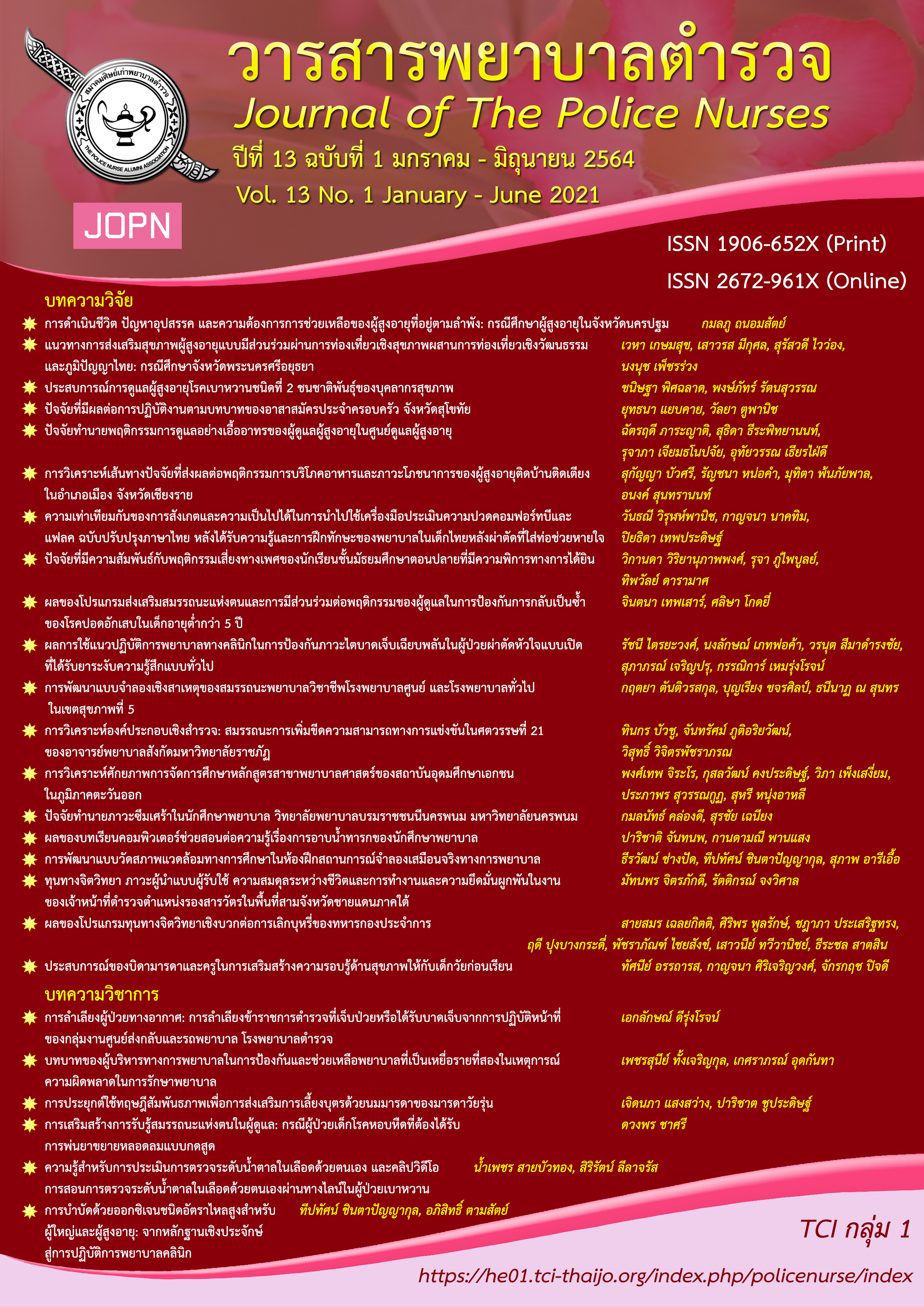PREDICTIVE FACTORS OF CARING BEHAVIORS AMONG CAREGIVERS OF ELDERLY PEOPLE IN THE ELDERLY CARE CENTERS
Keywords:
caring behaviors, caregivers, attitude towards the elderly, knowledgeAbstract
This predictive research aimed at determining the predictive factors of caring behaviors among caregivers of elderly people in the elderly care centers. The samples were selected by the purposive selection total of 100 subjects from 7 the elderly care centers. Research instruments included the questionnaires of personal data, the caring behaviors scale, the attitude towards the elderly people scale, and the knowledge of the elderly care scale. Their reliabilities were .93, .92, and .81 respectively. Data were analyzed using descriptive statistics and stepwise multiple regression analysis.
The results showed that the sample had the mean score of caring behaviors at a very good level (M = 4.50, SD = 0.59) and found that only a positive attitude towards the elderly could predicted the caring behaviors among caregivers with accounted for 56.6 percent of variance explained at the level of .05 (F (1, 94) = 122.378, p = .000, R = .752, R2 = .566, R2Adjusted = .561). These findings suggested that administrators of the elderly care center should encourage caregivers to have a positive attitude towards the elderly so that the elderly people receive caring.
Downloads
References
Bureau of Elderly Health, Department of Health, Ministry of Public Health. (2014). Guidelines for training of elderly caregivers 420 hours course (2nd ed.) Bangkok: Office of the Welfare Organization Printing House Veteran.
Chaichumpon, C., Thongphao, N., & Taejarernwiriyakul, O. (2018). Knowledge and health care behavior for the elderly with movement disability of family caregivers in Tambon Phayu, Kraseng district, Sisaket province. Journal of Health and Nursing Education, 24(2), 52-66.
Chompunud, M. S., Charoenyooth, C., Palmer, M. H., Pongthavornkamol, K., Vorapongsathorn, T., & Jitapunkul, S. (2010). Prevalence associated factors and predictors of elder abuse in Thailand. Pacific Rim International Journal of Nursing Research, 14(4), 283-296.
Institute for Population and Social Research and Foundation of Thai Gerontology Research and Development Institute. (2019). Situation of the Thai elderly 2019. Bangkok: Printery Co; Ltd.
Jandaeng, B., Kosolkittiamporn, S., & Kenaphoom, S. (2019).Factors that affecting behavior change. Dhammathas Academic Journal, 19(4), 235-244.
Khumtorn, L., Suwanvela, S., & Singsanun, N. (2018). Factors predicting caring behaviors of caregivers for chronic schizophrenic patients at home. Mahasarakham Hospital Journal, 5(3), 114-125.
Kim, J. H., & Song, M. S. (2020). The effects of awareness of human rights on compliance of caring behavior of long-term care workers. Journal of Korean Academic Society of Home Health Care Nursing, 27(1), 5–15. https://doi.org/10.22705/jkashcn.2020.27.1.5
Kitreerawutiwong, K., & Kitreerawutiwong, N. (2018). The development direction for long-term care giver in community. Journal of Nursing and Health Care, 36(4), 15-24.
Kosolchuenvijit, J. (2013). Caring: Central focus of humanistic care. Journal of Boromarajonani College of Nursing, Bangkok, 29(2), 134-142.
Kumsom, C., Lagampan, S., & Boonyamalik. P. (2019). Factors Influencing caring practices for dependent older adults in the long term care system: Roi Et province. Thai Red Cross Nursing Journal, 12(2), 193-207.
Leethong-in, M., & Piyawattanapong, S. (2015). Predicting factors of age-friendly nursing care behavior by nursing students-nursing practice subject. Journal of Nursing and Health Care, 3(3), 70-79.
Liu, Z., Pu, L., Wang, H., & Hu, X. (2014). Survey of attitude towards and understanding of the elderly among Chinese undergraduate medical students. Asian Biomedicine, 8(5), 615-622. https://doi.org/10.5372/1905-7415.0805.335
Sirisom, K., Wunnawilai, P., & Kaewmahakan, O. (2009). Caring behaviors of nursing students during a practicum in the nursing care of persons with health problem I course, as perceived by themselves, instructors and clients. Boromarajonanicollege of nursing, Songkhla.
Summawong, K., Somanusorn, S., & Sumngern, C. (2017). Factors related to elder abuse from perspective of older adults and family members. Journal of Boromarajonani College of Nursing, Bangkok, 33(1), 90-103.
Thato, R. (2018). Nursing research: Concepts to application (3rd ed.). Bangkok: Chulalongkorn University Printing House.
Thailand Development Research Institute. (2019). Elderly care business. Thailand Development Research Institute (TDRI), 151(April), 1-15. Retrieved from https://tdri.or.th/2019/07/elderly-care-business/
Vongchavalitkul, B., Sanguanwongwan, W., Chatchaisucha, S., Limsarun, T., Thaisamak, S., & Ruengkhajhon, K. (2016). Knowledge and attitude of the elderly caregivers: A case study of Thammapakorn Phoklang and Watmuang elderly care center Nakhonratchasima province. Journal of Business Administration the Association of Private Higher Education Institutions of Thailand, 5(2), 74-92.
Watson, J. (2008). Nursing: The philosophy and science of caring (revised edition). Cololado: University Press of Colorado.
Watson, J. (2009). Assessing and measuring caring in nursing and health science. New York, NY: Springer Publishing Company.
Yon, Y., Mikton, C. R., Gassoumis, Z. D., & Wilber, K. H. (2017). Elder abuse prevalence in community settings: A systematic review and meta-analysis. Lancet Glob Health, 5(2), 147-156. https://doi.org/10.1016/S2214-109X(17)30006-2
Yon, Y., Ramiro-Gonzalez, M., Mikton, C. R., Huber, M., & Sethi, D. (2019). The prevalence of elder abuse in institutional settings: a systematic review and meta-analysis. European journal of public health, 29(1), 58-67. https://doi.org/10.1093/eurpub/cky093
Downloads
Published
How to Cite
Issue
Section
License
ผลงานที่ได้ตีพิมพ์แล้วจะเป็นลิขสิทธิ์ของวารสารพยาบาลตำรวจ















